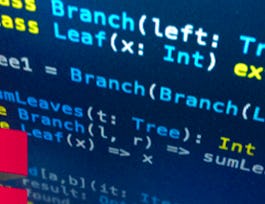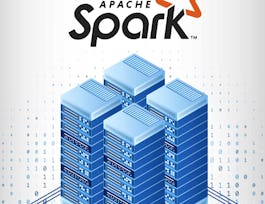Manipulating big data distributed over a cluster using functional concepts is rampant in industry, and is arguably one of the first widespread industrial uses of functional ideas. This is evidenced by the popularity of MapReduce and Hadoop, and most recently Apache Spark, a fast, in-memory distributed collections framework written in Scala. In this course, we'll see how the data parallel paradigm can be extended to the distributed case, using Spark throughout. We'll cover Spark's programming model in detail, being careful to understand how and when it differs from familiar programming models, like shared-memory parallel collections or sequential Scala collections. Through hands-on examples in Spark and Scala, we'll learn when important issues related to distribution like latency and network communication should be considered and how they can be addressed effectively for improved performance.



Big Data Analysis with Scala and Spark
This course is part of Functional Programming in Scala Specialization

Instructor: Prof. Heather Miller
Sponsored by ITC-Infotech
101,061 already enrolled
(2,587 reviews)
Details to know

Add to your LinkedIn profile
See how employees at top companies are mastering in-demand skills

Build your subject-matter expertise
- Learn new concepts from industry experts
- Gain a foundational understanding of a subject or tool
- Develop job-relevant skills with hands-on projects
- Earn a shareable career certificate


Earn a career certificate
Add this credential to your LinkedIn profile, resume, or CV
Share it on social media and in your performance review

There are 4 modules in this course
Get up and running with Scala on your computer. Complete an example assignment to familiarize yourself with our unique way of submitting assignments. In this week, we'll bridge the gap between data parallelism in the shared memory scenario (learned in the Parallel Programming course, prerequisite) and the distributed scenario. We'll look at important concerns that arise in distributed systems, like latency and failure. We'll go on to cover the basics of Spark, a functionally-oriented framework for big data processing in Scala. We'll end the first week by exercising what we learned about Spark by immediately getting our hands dirty analyzing a real-world data set.
What's included
7 videos7 readings3 programming assignments
This week, we'll look at a special kind of RDD called pair RDDs. With this specialized kind of RDD in hand, we'll cover essential operations on large data sets, such as reductions and joins.
What's included
4 videos2 programming assignments
This week we'll look at some of the performance implications of using operations like joins. Is it possible to get the same result without having to pay for the overhead of moving data over the network? We'll answer this question by delving into how we can partition our data to achieve better data locality, in turn optimizing some of our Spark jobs.
What's included
4 videos
With our newfound understanding of the cost of data movement in a Spark job, and some experience optimizing jobs for data locality last week, this week we'll focus on how we can more easily achieve similar optimizations. Can structured data help us? We'll look at Spark SQL and its powerful optimizer which uses structure to apply impressive optimizations. We'll move on to cover DataFrames and Datasets, which give us a way to mix RDDs with the powerful automatic optimizations behind Spark SQL.
What's included
5 videos2 programming assignments
Instructor

Offered by
Why people choose Coursera for their career




Learner reviews
2,587 reviews
- 5 stars
72.94%
- 4 stars
21.10%
- 3 stars
4.44%
- 2 stars
0.65%
- 1 star
0.85%
Showing 3 of 2587
Reviewed on Nov 28, 2019
Excellent overview of Spark, including exercises that solidify what you learn during the lectures. The development environment setup tutorials were also very helpful, as I had not yet worked with sbt.
Reviewed on Apr 8, 2017
Excellent material. Very good flow. Heather has an amazing way of walking through the flow and simplifying the concepts. Great assignments -- takes a bit longer than 3 hours.
Reviewed on Jun 7, 2017
The sessions where clearly explained and focused. Some of the exercises contained slightly confusing hints and information, but I'm sure those mistakes will be ironed out in future iterations. Thanks!
Recommended if you're interested in Computer Science

École Polytechnique Fédérale de Lausanne

Open new doors with Coursera Plus
Unlimited access to 10,000+ world-class courses, hands-on projects, and job-ready certificate programs - all included in your subscription
Advance your career with an online degree
Earn a degree from world-class universities - 100% online
Join over 3,400 global companies that choose Coursera for Business
Upskill your employees to excel in the digital economy





